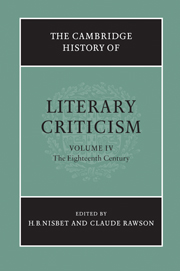Book contents
- Frontmatter
- INTRODUCTION: CRITICISM AND TRADITION
- GENRES
- LANGUAGE AND STYLE
- THEMES AND MOVEMENTS
- 18 Sensibility and literary criticism
- 19 Women and literary criticism
- 20 Primitivism
- 21 Medieval revival and the Gothic
- 22 Voltaire, Diderot, Rousseau and the Encyclopédie
- 23 German literary theory from Gottsched to Goethe
- 24 The Scottish Enlightenment
- 25 Canons and canon formation
- LITERATURE AND OTHER DISCIPLINES
- Bibliography
- Index
- References
20 - Primitivism
from THEMES AND MOVEMENTS
Published online by Cambridge University Press: 28 March 2008
- Frontmatter
- INTRODUCTION: CRITICISM AND TRADITION
- GENRES
- LANGUAGE AND STYLE
- THEMES AND MOVEMENTS
- 18 Sensibility and literary criticism
- 19 Women and literary criticism
- 20 Primitivism
- 21 Medieval revival and the Gothic
- 22 Voltaire, Diderot, Rousseau and the Encyclopédie
- 23 German literary theory from Gottsched to Goethe
- 24 The Scottish Enlightenment
- 25 Canons and canon formation
- LITERATURE AND OTHER DISCIPLINES
- Bibliography
- Index
- References
Summary
Primitivism may be defined as the idealization of a way of life that differs from our own in being less complicated, less polished, and less self-aware. It may be found in an abstract state of nature, in the countryside where the influence of the city and the court has not been felt, in some land distant from the corruptions of western Europe, or in the historical past. The most important critical debates associated with primitivism during the period between 1660 and 1800 involved a spectrum of positions which were intimately connected with political and social attitudes, and isolating the aesthetic from these contexts is neither possible nor useful. In England, the return of Charles II entailed a rejection of the past – literary as well as political – as a time of barbarism. In some ways, the defacing of the bodies of Oliver Cromwell and the regicides had its counterpart in the criticism of Thomas Rymer, who treated Shakespeare and his contemporaries as writers who knew nothing about art or decorum. The ‘last age’ was to make way for a time of order, control, and polish in both politics and poetry.
Despite some notable exceptions, primitivism, when presented as an unmitigated ideal, functioned in the realm of criticism the same way as it operated in politics. It was invoked by those offering views of art and life that appealed to innovation and freedom. Although the main focus of this discussion will be upon critical debates over what might be considered primitive art forms, poetic figures, and language, none of this is intelligible without a brief discussion of the phenomenon of primitivism itself and its appearance in contemporary literature.
- Type
- Chapter
- Information
- The Cambridge History of Literary Criticism , pp. 456 - 469Publisher: Cambridge University PressPrint publication year: 1997
References
- 2
- Cited by



